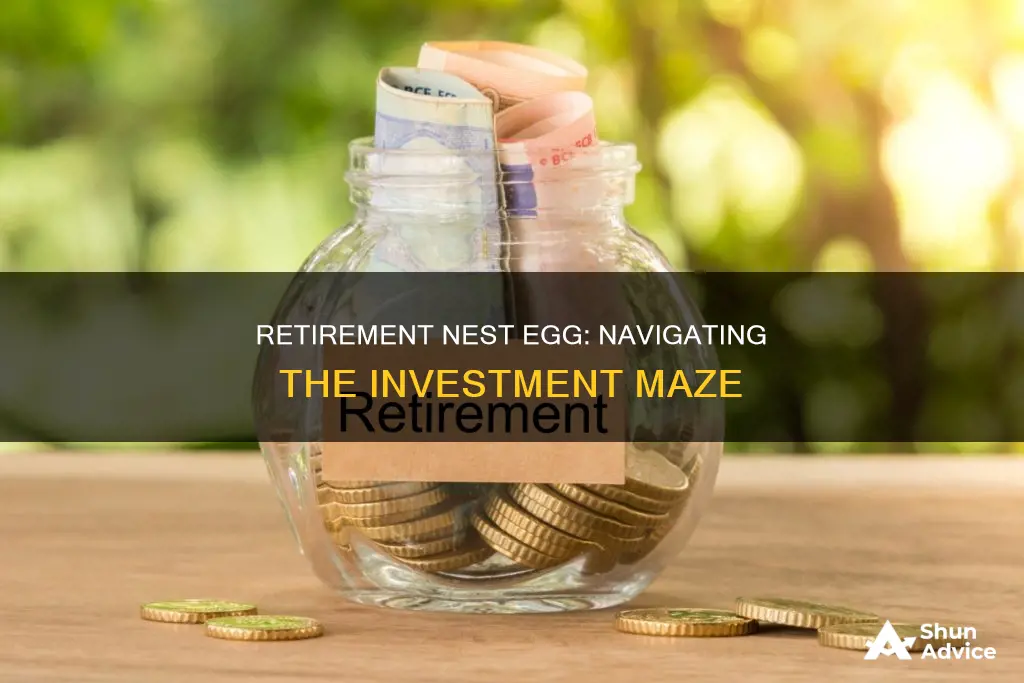
A nest egg is a substantial sum of money or other assets that are typically earmarked for long-term objectives, the most common being retirement. The term is believed to have originated from poultry farmers, who would place fake eggs in hens' nests to encourage them to lay more eggs, thus increasing their income. Similarly, a nest egg is used to preserve and grow capital to achieve financial goals.
When it comes to building a nest egg for retirement, it's important to start as early as possible to take advantage of compound interest. This involves regularly contributing a portion of your income to a retirement savings account, such as a 401(k) or IRA, which offer tax advantages. It's also crucial to choose the right investments, balancing risk and return to ensure your money grows over time.
In addition to traditional retirement accounts, a nest egg can include other investments such as real estate or valuable artwork. Diversifying your portfolio helps protect against inflation and market fluctuations. Seeking advice from a financial advisor can also help optimise your plan and ensure you're on track to meet your retirement goals.
| Characteristics | Values |
|---|---|
| Definition | A substantial sum of money or other assets saved or invested for a specific purpose |
| Purpose | Retirement, buying a home, education, emergency funds |
| Investment Objective | Preserving capital and achieving growth to offset inflation |
| Investment Types | Certificates of deposit, bonds, dividend-paying blue chips, real estate, artwork and collectibles |
| Recommended Savings Rate | 15% of gross income |
| Investment Accounts | 401(k), IRA, Roth IRA, Annuity |
| Investment Strategies | Low-risk stocks, diversification, compound growth |
| Debt Management | Eliminate debt, build an emergency fund before investing |
What You'll Learn

Choose the right account
Choosing the right account to build your nest egg is crucial. There are several options to consider, each with its own advantages and suitability depending on your goals and circumstances. Here is an overview of some of the most common account types for building a retirement nest egg:
Employer-Sponsored Plans:
- Traditional 401(k): This is a popular option offered by employers, allowing you to contribute a portion of your paycheck pre-tax, reducing your taxable income. Your contributions may be tax-deductible, and your employer may match your contributions up to a certain percentage, providing free money to boost your nest egg. The money grows tax-deferred, and you pay taxes when you withdraw during retirement.
- Roth 401(k): Similar to the traditional 401(k), but contributions are made with after-tax dollars. The main advantage is tax-free withdrawals during retirement, as you've already paid taxes on the contributions.
Individual Retirement Accounts (IRAs):
- Traditional IRA: This is an individual retirement account that you open on your own, separate from your employer. Contributions may be tax-deductible, and the account benefits from tax-deferred growth. Taxes are paid when you make withdrawals in retirement. There are annual contribution limits, and you may receive a tax deduction for your contributions.
- Roth IRA: Funded with after-tax dollars, the Roth IRA offers tax-free growth and withdrawals. While you don't get an upfront tax break on contributions, you won't pay taxes when you withdraw the money, as long as the account has been open for at least five years and you are 59½ or older. Like the traditional IRA, the Roth IRA also has annual contribution limits.
Brokerage Account:
A brokerage account allows you to invest in securities like stocks, bonds, and funds. While the stock market can be volatile, investing over the long term can potentially provide higher returns than savings accounts and help your nest egg keep pace with inflation.
High-Yield Savings Account:
While savings accounts may not offer the highest returns, they provide easy access to your funds and are a good option for short-term goals or unexpected expenses. A high-yield savings account can offer higher interest rates, helping your nest egg grow faster.
When choosing the right account, it's important to consider your time horizon, tax advantages, employer matching contributions, and the level of risk and potential returns associated with each option. It's also worth noting that you can diversify your nest egg by utilising multiple account types to maximise their benefits.
Investing: A New National Pastime?
You may want to see also

Choose the right investments for your needs
Choosing the right investments for your retirement nest egg is crucial to ensure your financial security in your golden years. Here are some detailed guidelines to help you make the right choices:
Time Horizon and Risk Tolerance:
The first step is to consider your time horizon, which is the number of years until you need the money. If you have decades until retirement, you can be more aggressive with your investments, as you have time to ride out market fluctuations. In this case, investing in stocks or higher-return assets is a good option, as they tend to outperform other asset classes over time, despite short-term volatility.
Balancing Risk and Return:
If your retirement is just a few years away, it's essential to stick to safer investments to ensure your money is there when you need it. Opt for conservative instruments such as bonds, high-yield savings accounts, or certificates of deposit. If you're somewhere in the middle, with around 5-10 years to go, a balanced approach is best. Include some stocks for growth potential but balance them with less risky assets like bonds to reduce overall risk.
Diversification:
Diversification is a key principle in investing. Don't put all your eggs in one basket. Spread your investments across various asset classes, sectors, and geographic regions. This helps to reduce risk and maximize returns. Invest in a mix of large and small companies, and consider ETFs and mutual funds, in addition to individual stocks.
Tax-Advantaged Accounts:
Take advantage of tax-advantaged retirement accounts like a traditional 401(k), Roth 401(k), traditional IRA, or Roth IRA. These accounts offer valuable tax benefits, such as tax-free growth or tax-deductible contributions. If your employer matches your contributions, that's essentially free money, so contribute enough to take full advantage of this.
Seek Professional Advice:
Consider working with a financial advisor, especially if you're new to investing. They can help you create a personalized investment plan that aligns with your retirement goals, risk tolerance, and time horizon. A financial advisor can also guide you through different investment options, including stocks, bonds, annuities, and more, ensuring you make informed decisions.
Remember, investing for retirement is a long-term endeavour, and it's important to stay disciplined and avoid making impulsive decisions based on short-term market movements. Regularly review and adjust your investment portfolio as needed to ensure it continues to meet your retirement goals and time horizon.
Planning for Retirement: Navigating the Investment Scale-Back
You may want to see also

Add to the account regularly
Adding to your nest egg regularly is essential to achieving your financial goals. The sooner you start saving, the more time your money has to benefit from compounding. Even if you can only afford small contributions, starting early will help you take advantage of the power of compounding to grow your money faster.
For example, if you invest $100 in a savings account with a 10% annual interest rate, you will have $110 at the end of the first year. In the second year, you will earn interest on the principal amount of $100 plus the $10 you earned in interest during the first year. This means you will have $121 at the end of the second year.
If you continue to reinvest the interest, your money will grow faster over time. This is the power of compounding, and it can make a significant difference to your nest egg over the long term.
To ensure you add to your nest egg regularly, consider setting up an automatic monthly transfer to your designated account. This will help you stick to your savings plan and ensure you are consistently working towards your financial goals.
The amount you should invest depends on your goals, timeline, and budget. Many experts suggest putting 10-20% of your income into your retirement account, but this may not always be feasible. It is important to start with what you can afford and adjust your contributions over time as your circumstances change.
If you are saving for retirement, it is generally recommended to invest in higher-returning investments like an S&P 500 index fund if you have decades before you retire. These types of investments can help your nest egg grow faster than inflation.
However, if you need to access your money sooner for a specific expense, consider lower-risk investments like government bonds, high-yield savings accounts, and bank certificates of deposit (CDs). These types of investments will help preserve your capital and ensure your money is there when you need it.
Remember, the key to growing your nest egg is to add to it regularly and take advantage of compounding. Start with what you can afford, and adjust your contributions as you are able. By doing so, you will be well on your way to achieving your financial goals.
ESG Investing: Who's On Board?
You may want to see also

Pay off your mortgage
Paying off your mortgage before you retire can be a good idea, but it depends on your individual situation. Here are some reasons why you might want to pay off your mortgage early:
Reduce baseline expenses
If your monthly mortgage payment is a significant expense, paying it off will allow you to live on a lot less once you retire. This can be especially helpful if you're on a limited income.
Save on interest payments
Mortgage loans can accrue interest costing hundreds of thousands of dollars over time. Paying off your mortgage early frees up that money for other uses.
Peace of mind
Paying off your mortgage can provide peace of mind and increase flexibility in retirement. It's one less worry and means you own your home outright.
Interest rate is higher than risk-free returns
If your mortgage rate is higher than the after-tax rate of return on a low-risk investment with a similar term, such as a high-quality, tax-free municipal bond, then you'd be better off paying down the mortgage than investing the money.
However, there are also reasons why you might not want to pay off your mortgage early:
Catch up on retirement savings
If you're not contributing enough to your retirement accounts, such as a 401(k) or IRA, increasing those contributions should be a priority. Savings in these accounts grow tax-deferred until withdrawal.
Low cash reserves
It's important to have cash reserves of three to six months' worth of living expenses in case of emergency. Paying off your mortgage early could leave you house-rich but cash-poor.
Higher-interest debt
Before paying off your mortgage, focus on paying off any higher-interest loans, especially nondeductible debt from sources like credit cards.
Miss out on investment returns
If your mortgage rate is lower than what you'd earn on a low-risk investment, you might consider keeping the mortgage and investing any extra funds. This is a personal decision and depends on your financial goals and risk tolerance.
In summary, paying off your mortgage early can provide benefits such as reduced expenses, savings on interest, and peace of mind. However, it's important to consider your overall financial situation and seek advice from a professional financial advisor before making any decisions.
Impact Investing: Asian Youths' Perspective
You may want to see also

Pay off other debts
Before you start investing your nest egg, it's important to pay off any other debts you have. This is because any debts will be costing you money in interest, and the longer you take to pay them off, the more money you lose.
If you have high-interest debt, such as credit card debt, this should be your priority. Credit card debt can ruin your finances quickly, so it's important to get it under control as soon as possible. Other types of debt, such as a mortgage, are generally low-interest and can be paid off gradually as you build up equity.
It's also worth noting that if you have any debts with an interest rate higher than the return on your investments, you should focus on paying off those debts first. This is because the longer you hold onto those debts, the more money you will lose to interest.
However, it's important to balance debt repayment with saving for retirement. You should aim to contribute enough to your retirement savings to take full advantage of any employer matching programs, such as a 401(k) match. This will give you a high return on your investment, which can offset the interest you're paying on your debts.
Additionally, you should also make sure to build up an emergency fund of three to six months' worth of living expenses. This will help you avoid taking on new debt if an unexpected expense arises.
Once you've taken care of your high-interest debts, maximised your employer match, and built up an emergency fund, you can focus on investing for retirement. This will ensure that you're not losing money to interest while also building a secure financial future.
Remember, the key to successful financial planning is finding a balance between debt repayment and saving for the future. By following these steps, you'll be able to achieve both goals and set yourself up for a comfortable retirement.
The Smart Money Move: Pay Off Debt, Then Invest
You may want to see also
Frequently asked questions
A nest egg is a substantial sum of money or other assets that have been saved or invested for a specific purpose, usually retirement. The term is believed to have originated from poultry farmers, who would place fake eggs in hens' nests to encourage them to lay more.
This will depend on your personal circumstances, but a recent study found that about 63% of American workers believe they will need $500,000 or more to retire comfortably.
You can grow your nest egg by investing in stocks, bonds, savings accounts, or other assets such as real estate or valuable artwork. It's also important to start saving as early as possible to take advantage of compound growth.
Your nest egg's biggest enemy is inflation. Over time, inflation eats away at the purchasing power of your money, so it's important to invest in assets that can beat inflation over time, such as stocks.
This is a personal decision and depends on your financial goals and comfort with investing. A financial advisor can help you optimise your financial plan and ensure you have enough money to retire, but they may also charge fees that eat into your nest egg.







